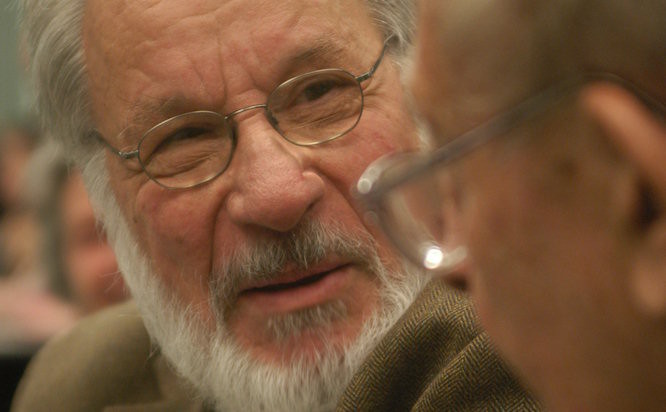Towards a Critical Cybernetics by
Klaus Krippendorff
February 28, 9:00 PST, 12:00 EST, 6:00 CET
ASC Speaker series: Cybernetics and humans’ knowing
Recording
Abstract
Klaus Krippendorff (wikipedia) has been involved with cybernetic thinking for many decades now. During this presentation he will discuss his current thoughts on what he refers to as “Critical Cybernetics,” as a follow up to his talk, “Agency Algorithms, New Forms of Oppression and How Cybernetics Might Help,“ at the American Society for Cybernetics conference in 2019.
Critical Cybernetics is his response to the observation that people often uncritically focus either on small problems they think are solvable within the context of existing institutions, are satisfied with their own understanding and describing their observations as outsiders, and are unaware of how their language affects what they are describing. All of which make it difficult the larger social consequences of what our interactions with technologies set in motion.
Participant bio
Klaus Krippendorff is the Gregory Bateson emeritus professor for cybernetics, language, and culture at the Annenberg School for Communication, University of Philadelphia. He was a student of Ross Ashby, is a long-time member of American Society for Cybernetics and has a history of applying cybernetics to social phenomena; communication in particular.
Klaus has a background in design which brings him closer to seeing the social world in which we live as being constructed and constantly reconstructed, by actions that are in turn shaped by different discourses, among which the reflexive language of cybernetics is an especially potent one.
Critical Cybernetics
Klaus Krippendorff will present his latest insights about how cybernetic technologies not merely mediate between members of society but tend to confine human agency.
“Critical Cybernetics” is his response to the observation that people often uncritically focus either on small problems they think are solvable within the context of existing institutions, are satisfied with their own understanding and describing their observations as outsiders, and are unaware of how their language affects what they are describing. These approaches make it difficult to address the larger social consequences of what our interactions with technologies set in motion.
- Klaus will show that over the last 50 years, reliance on uncritical cybernetics, namely circular causal explanations, has advanced the design of cybernetic technologies but remained blind to their larger social implications. One of its unintended consequences is the exponential growth of digitalizing business and government practices that thrive on the economic benefits of cybernetic technologies. As a consequence, corporations and bureaucracies have become increasingly automated, algorithmized, and closed to human control, thus rendering the population of innocent users as mere customers and operators.
- Klaus’ main thesis is that our own everyday vocabularies, metaphors in dominant narratives mistakenly attribute agency to technologies and social systems which implies the blind surrender of our own agency and entraps us in submission to the algorithmic logic of cybernetic technologies. Uncritical cybernetics’ lack of considering these social consequences has fed the unfettered growth of huge technologically driven complexes and encouraged a new form of oppression.
- Critical cybernetics is critical insofar as it aims to emancipate members of social systems from burdensome entrapments by uncritically designed and used cybernetic technologies. It recognizes that language not merely describes observations; using it can change observations. Modifications of how we language reality into being can liberate speakers from this new form of oppression. Klaus is not promoting a particular ethic, rather he is encouraging critical cyberneticians, and all who care, into new conversations capable of critically examining the social consequences of all imaginable cybernetic technologies. He argues that this is a way to regain human agency where it was lacking or felt intolerable.





